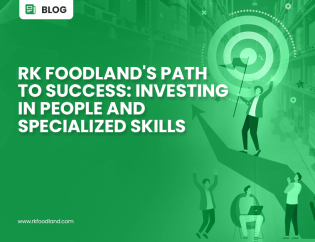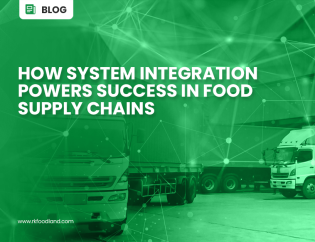
The complexity of food industry continues to grow making effective supply chain management increasingly vital for businesses. In coming year, the food industry is expected to prioritize customer satisfaction, sustainability, and resilience. A strong and efficient supply chain is essential for achieving these goals and determining success of a company. In light of this, we have identified the top 10 factors that will have a significant impact on improvement and development of supply chains in 2023. These factors will shape the future of food supply chains and play a crucial role in ensuring success of businesses in this industry.
1. Customer Centricity
In today’s demand-driven and competitive market, customer centricity is critical for businesses to remain competitive and sustainably meet the needs of their customers. From a competition standpoint, customer centricity is important because it helps food businesses to differentiate themselves from their competitors by offering unique and innovative products or services built with customers’ feedback in mind, and fostering strong, loyal customer relationships with positive customer experience. To improve customer centricity, food businesses in 2023 should develop or look for supply chain partners who have strong capabilities in areas such as forecasting, inventory management, and delivery speed, as well as a willingness to collaborate and adapt to changing customer needs. These capabilities will ensure that the food business is able to consistently meet customer demand, deliver high-quality products, and respond quickly to any changes in customer preferences.
2. Diversified Channels in Food Industry
The food industry is undergoing a significant transformation, with traditional supply-driven model giving way to a more demand-driven ecosystem. In order to meet the needs of increasingly demanding consumers, food businesses will need to explore a variety of distribution channels and consumption mechanisms like takeaway, drive-thru, vending machines, away-from-home, curbside pick-up, D2C, dark stores, e-stores, ghost kitchens and more. However, these channels will only be effective if backed by equally dynamic supply chain capabilities and capacities. The growing prevalence of last mile delivery challenges, coupled with complex offerings, means that businesses may need to review their inventory distribution networks and incorporate integrated planning and fulfillment capabilities in order to stay competitive. It is clear that in order to succeed in this rapidly changing landscape, food businesses must be proactive and forward-thinking in their approach towards supply chain management. By investing in strong capabilities and diversifying their channels, businesses can position themselves for success in the demand-driven market of future.
3. Predictive Analytics
Predictive analytics is a powerful tool that can help food businesses to optimize their supply chain and gain a competitive advantage. By analysing data on past sales, customer behaviour, and market trends, food businesses can use predictive analytics to make more accurate predictions about future demand for their products, leading to improved inventory management, reduced waste, and cost savings. According to Gartner, organisations embracing predictive supply chains have successfully been able to reduce their inventories by 20% to 30%. Additionally, predictive analytics can be used to identify bottlenecks in supply chain and identify opportunities for improvement, such as reducing lead times, improving supplier performance, or optimizing transportation routes. By leveraging these capabilities, food businesses can be better equipped to anticipate and respond to changes in customer demand and market conditions, leading to increased efficiency and profitability. Therefore, it is clear that investing in predictive analytics can be a valuable strategy for food businesses looking to stay competitive in the demand-driven market of future.
4. Integrated Supply Chains
Integrated supply chains are becoming increasingly important in the food industry, and will play a critical role in success of food businesses in 2023 and beyond. An integrated supply chain is one in which all of the different components and partners in supply chain are working together seamlessly, with a focus on meeting the needs of the customer. By investing in an integrated supply chain, food businesses can improve efficiency, reduce costs, increase customer satisfaction, and better align their production and distribution with actual customer demand. These benefits can help businesses to stay competitive, reduce costs, and increase profitability in the demand-driven market of future. In order to prepare for supply chain integration, food businesses should consider taking steps such as investing in technology and data management systems, collaborating with supply chain partners, and building strong relationships with customers. By taking a proactive and forward-thinking approach, food businesses can position themselves for success in the integrated supply chain of future.
5. Increased Focus on Assurance
It is likely that food businesses will continue to increase their focus on assurance in 2023 in order to remain competitive and meet the evolving needs and expectations of their customers. This includes implementing robust food safety management systems and ensuring compliance with all relevant food quality regulations. One way to fast track assurance is to identify a right supply chain partner. A partner with a strong track record of meeting food safety and quality standards can help to reduce risk and ensure that the business is compliant with all relevant regulations. In addition, a partner with a robust supply chain capacities and capabilities in place can help to improve visibility and traceability, making it convenient for business to trace the movement of its products throughout the supply chain. Overall, by taking a proactive and forward-thinking approach towards supply chain partnerships, food businesses can position themselves for growth and success in the demand-driven market of future.
6. Automation and artificial intelligence
Artificial intelligence (AI) has potential to revolutionize the way food businesses approach supply chain management, and is an important tool for businesses looking to stay competitive and achieve long-term success. By analysing data from previous processes, food businesses can use AI algorithms to identify patterns and predict purchasing demands, eliminating guesswork and reducing the risk of major losses. Research says, this can help businesses to better manage their inventory with 15% forecast accuracy and 25% lesser disruptions in planning cycles. In addition, by leveraging AI, food businesses can eliminate human errors and improve accuracy, leading to increased efficiency and cost-effectiveness. In 2023 and beyond, food businesses can look forward to the continued evolution and adoption of AI in the supply chain, leading to increased efficiency and cost-effectiveness, and enabling businesses to stay competitive in the demand-driven market of future.
7. Green Supply Chains
As the food industry continues to evolve, food businesses must be proactive in adopting green logistics and other ESG trends in order to stay competitive. Green logistics, for instance, involves use of fuel efficient transportation powered by biodiesel and other green fuels, which can help to reduce carbon emissions and dependency on non-renewable energy sources. Eco-friendly warehouses that feature advanced energy management systems can also significantly reduce environmental impact of food businesses by monitoring and controlling the usage of electricity, heat, water, and gas. Furthermore, the adoption of circular supply chains, which involves reuse and recycling of materials and resources to minimize waste, will become increasingly important in the coming years. It is imperative that food businesses embrace these and other sustainability initiatives in order to position themselves for success in the demand-driven market of future.
8. Diversity & Inclusion
In 2023, diversity and inclusion will continue to be an important factor for food businesses. Customers are increasingly demanding that businesses demonstrate a commitment to social responsibility, and are more likely to support businesses that reflect the values and needs of their communities. To be prepared for the evolving market, food businesses should focus on nurturing D&I champions, as well as implementing policies and practices that instil a diverse and inclusive workplace culture. This can include things like developing a clear mission statement, establishing goals, and providing training and resources to support diversity and inclusion efforts. By prioritizing ESG responsibilities, food businesses can position themselves for success in the long-term, and better meet the evolving needs and preferences of their customers.
9. Supply Chain Resiliency
Supply chain resiliency will continue to be a top trend for food businesses, as they look to navigate an increasingly uncertain and volatile market. To be better prepared and achieve resiliency more quickly, food businesses should focus on building flexible and agile supply chains that are able to adapt to changes in the environment. This can involve developing strong supply chain partnerships, investing in advanced technologies like AI and IoT, integrating supply chain systems, and implementing contingency plans to respond to potential disruptions. By taking these and other proactive steps, food businesses can position themselves for success in the long-term, and be better prepared to weather any challenges that may arise in the BANI (Brittles, Anxious, Non-linear, and Incomprehensive) world.
10. Supply Chain Partnership
To prepare for an outcome-driven strategic supply chain partnership, food businesses should focus on identifying potential supply chain partners that can meet their needs and align with their goals. This may involve conducting thorough research and vetting potential partners to ensure they are reputable and capable of delivering high-quality products and services. Food businesses should also have a clear understanding of their supply chain needs, including the type and quantity of products required, delivery schedules, and any special requirements such as packaging or labelling. Establishing strong relationships with potential partners is also key, as is using technology to improve visibility and efficiency in the supply chain. Finally, it is important for food businesses to have contingency plans in place in case of disruptions, such as having backup suppliers or the ability to source products from different locations. By taking these steps, food businesses can be better prepared for an outcome-driven strategic supply chain partnership that helps them achieve their goals and succeed in the marketplace.
These trends highlight the importance for food businesses to adopt the latest technology, implement sustainable practices, and establish strategic partnerships in order to remain competitive and deliver value to stakeholders. By doing so, they can stay ahead of the curve and maintain a competitive advantage. This can be achieved through a combination of proactive planning and a willingness to develop outcome driven partnerships with their ecosystem.
To learn more about how to effectively leverage these trends to benefit your business, connect with our team of experts. We have the knowledge and experience to support your business in navigating a complex and competitive market.
Feel free to reach out to us to start exploring your options.









